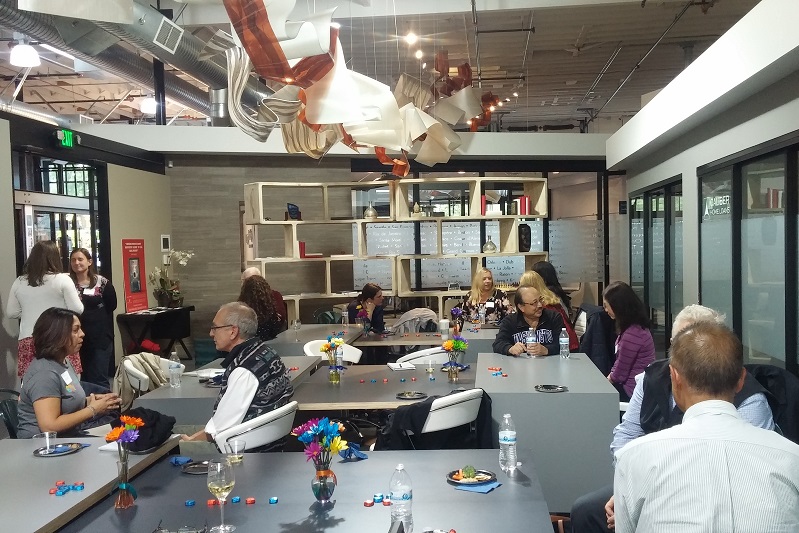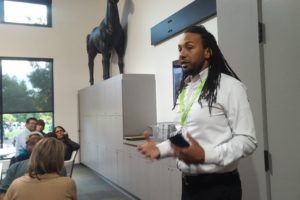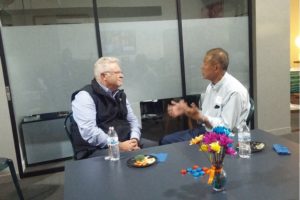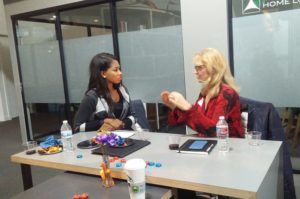Having a conversation around racial equity can be hard. But, it is necessary. The growing diversity, around the country and specifically our region, makes it imperative that such conversations become a focal point around the work we do. There is also much interest in this area – many people are talking about it and feel there is not much happening quickly enough to resolve some of the issues around racial equity.
Understanding the criticality of the need, in June 2017, the Bellevue School District (BSD), City of Bellevue, Eastside Pathways, and Leadership Eastside, held the first Eastside Racial Equity summit. The purpose was to bring together organizations across East King County to deepen individual understanding and commitment to racial equity and work towards having a more equitable Eastside. Read more here.
Continuing on that journey, a follow-up meeting “Conversations on Equity” was held on September 20, facilitated by Shomari Jones, Equity Director at BSD.
A group of about 25 folks from different organizations, including Lake Washington School District, Virginia Mason, Eastside Refugee and Immigrant Coalition, City of Bellevue gathered together to continue the conversation.

The first exercise set the tone for the evening. Shomari took the group through the process of mindful inquiry, which guides and helps people to focus on ‘listening’ while the speaker is talking. The point is to pay complete attention to those who are trying to tell their story without speaking or engaging. It enables deeper and more thoughtful engagement as the listener is forced to focus on the speaker and not hijack the conversation and make it about his/her own story.
Through mindful inquiry, we learn to change from being an “interrupters” (those who vacate active listening to insert their personal narrative) to being truly engaged and listening.
 Shomari shared his own experience of mindful inquiry: Expressing an opportunity to engage in a conversation on how race impacted his life. Per the format of Mindful inquiry, Shomari was given three minutes to synthesize experiences that could’ve easily taken 30 minutes to explain. When given the chance to share, his partner, a white female colleague, remained silent, while reflecting on her lack of comparable experiences, which ultimately created such discomfort that she began to weep.
Shomari shared his own experience of mindful inquiry: Expressing an opportunity to engage in a conversation on how race impacted his life. Per the format of Mindful inquiry, Shomari was given three minutes to synthesize experiences that could’ve easily taken 30 minutes to explain. When given the chance to share, his partner, a white female colleague, remained silent, while reflecting on her lack of comparable experiences, which ultimately created such discomfort that she began to weep.
He also spoke about some tenets of mindful inquiry that cause a disconnection. One of them is fear of the content and what that content entails – such as having a conversation about race with someone who has no interest in having that conversation or trying to avoid that conversation. Another is arrogance – “you are not telling me anything that I already don’t know so am checking out.”
Reiterating the challenge of listening intently, Shomari said, “We have to constantly check ourselves when we are listening, because your mind wanders – to our work, deadlines, family, etc. and so we have to learn to keep focused on honoring what the speaker is saying.”
After the exercise, when asked about their experiences, some of the people commented:
As the speaker:
- It gave me the opportunity to be expressive – to say what I wanted to.
- I enjoyed having the space to say something while not having questions to follow up immediately after I spoke.
As the listener:
- It was nice to think and ponder and know that I can come back to any thoughts that were shared with me.
- I felt it challenging not to ask questions and interact while my partner was talking. It made me feel a bit handicapped.
- I felt I was given the gift of someone’s story, and I loved it.
The takeaways
- Be mindful not only in this room or for this event, but with your spouse, children, colleagues, and anyone in your community.
- Remember, the person you are speaking to does not represent all people of his race or culture; only him/herself.
Another piece of the conversations that evening was around ‘what is white privilege’:


Some of the remarks shared were:
- When I was growing up the term white privilege wasn’t as popular or prevalent as it is today. I’m trying to define what that is and being in circles like this is helping me to understand what that means.
- It’s about being advantaged.
- The privilege exists because we live in a racist society. White privilege is a perpetrator of racism.
- Walking into a store and people not looking at me funny, and everywhere I go.
- As a white person with all the privileges and power, it’s humbling and thought-provoking. It makes me think as to “how can I utilize my power?”
Responding to a comment from someone who was wondering if meetings such as these are being utilized effectively and how to use the learning in their work, Shomari said:
“One of the things we need to ask is how much are we sacrificing to get what we want – especially those of us who are in the predominant culture and positions of power. How much are you sacrificing so that our key stakeholders understand? For me, my key stakeholders are the student who attends the BSD. Without students of color the white students will not grow up to be racial equity leaders, and they won’t be able to go out in the world and understand how to support better those who are historically marginalized. And so my sacrifice is that I have to put in the work every single day and work much harder for our kids.”
One of the hardest things to do is to talk about your thoughts to people who don’t understand the issue and being courageous to do that is the first step. We will continue this conversation in January. The date and location will be communicated shortly.
A big thank you to Anne Morisseau, City of Bellevue, for hosting this meeting at her workplace, Realogics Sotheby’s International Realty in Kirkland.
Article written by Sujata Agrawal, communications manager at Eastside Pathways with inputs from Shomari Jones, equity director at Bellevue School District
